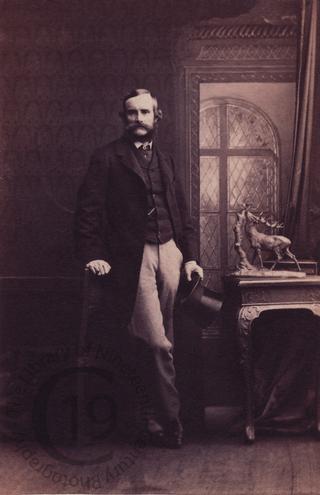
Dr Humphry Sandwith
A carte-de-visite portrait of Doctor Humphry Sandwith (1822-1881).
Humphry Sandwith was an Army physician and an author. He served in the Crimea and was present at the Siege of Kars, the last major operation of the war. In 1856 he published A Narrative of the Siege at Kars [full title: A narrative of the Siege of Kars, and of the six months' resistance by the Turkish garrison under general Williams to the Russian army; together with a narrative of travels and adventures in Armenia and Lazixtan, with remarks on the present state of Turkey]. In 1864 he published The Hekim Bashi: or, the Adventures of Giuseppe Antonelli, a Doctor in the Turkish Service.
Following his death, his nephew used his diaries to produce an account of Dr Sandwith’s life. According to a review of the biography that appeared in The Times (17 November 1884): ‘At Kars Sandwith acted as Inspector-General of Hospitals, which meant that he had the entire ambulance service under his control, and during the memorable siege he showed such admirable energy, ingenuity, and devotion, that when the capitulation was at length signed [the Russian general] gave him his freedom in consideration of his humane care for the Russian wounded.'
The review continues: ‘At this moment Dr Sandwith seemed to have the world at his feet. He returned to London, and became during a season the lion of society. He published [his history of the siege] which had an enormous sale; he received the Companionship of the Bath […] and finally the post of Colonial Secretary, or Prime Minister, to the Island of Mauritius. All this was pretty well for a young doctor of 34. Sandwith seems to have been a little intoxicated by his sudden success, and he did not use his opportunities prudently. He was not satisfied with the depressing climate of Mauritius, and his resigned his appointment before making sure of another, the consequence being that he was never employed again.’ In 1868 he stood as the Radical candidate for Marylebone against the sitting Liberal MP and was defeated by more than 3000 votes.
The reviewer quotes the author’s remark that Dr Sandwith was a leader ‘in the irregular forces which humanity enlists in the eternal campaign against tyranny, barbarism, and wrong’ and commends ‘the labours of a most meritorious life.' The reviewer then quotes various anecdotes from the book before closing: ‘On the whole, however, we may speak admiringly of a man who, if he occasionally stumbled in his attempts to set the world straight, was more loveable in his Quixotry than others in their never-ending selfishness.'
For further details of his life, see his extensive entry in the DNB.
Photographed by Camille Silvy of London on 24 January 1862.
Code: 124374




